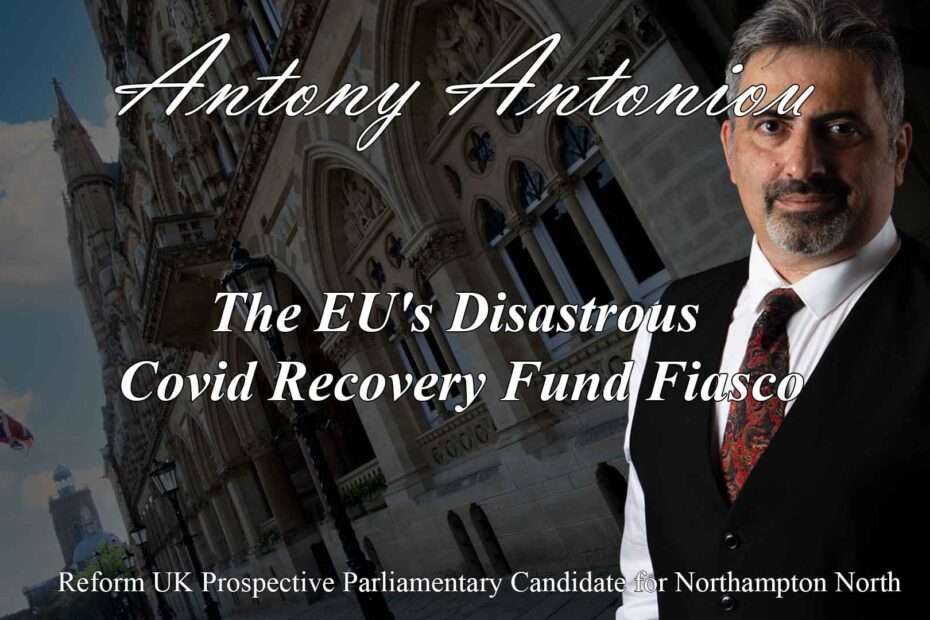The EU’s Disastrous Covid Recovery Fund Fiasco
A Financial Black Hole
The European Union is staring into a financial abyss as its much-touted Covid recovery fund has devolved into a morass of mismanagement, fraud, and wasteful spending. Unraveling the intricate web of where all the billions have gone will take years of arduous investigations by legions of auditors and forensic accountants. Sadly, the stark reality is that the vast majority of the misappropriated funds may never be recovered, lost forever to graft and corruption.
While some nations like Italy and Greece did see a short-term economic boost from the influx of recovery cash correctly allocated, this type of fleeting stimulus was entirely predictable. Simply flooding economies with money tends to provide an ephemeral sugar high before the eventual hangover sets in. The real question is how much of the fund was channeled into productive long-term investments that will pay dividends by structurally strengthening and modernizing European economies for years to come?
A Political Firestorm Looms
The staggering amount borrowed to finance the recovery fund will inevitably come due, and the burden of repayment will fall squarely on the shoulders of European taxpayers, primarily in economic powerhouses like Germany and the Netherlands. EU bureaucrats are already floating the idea of levying new taxes upon member states to cover the mountain of debt taken on.
If the recovery funds were invested judiciously in value-generating initiatives, citizens may begrudgingly accept the need for harsh austerity measures to restore fiscal balance. However, if it becomes apparent that these billions were simply squandered through incompetence and graft, the political backlash could potentially be catastrophic for the future cohesion of the entire European project.
Indeed, advocates of the recovery fund envisioned it as merely the opening salvo, with additional rounds of common EU borrowing to underwrite ambitious programs tackling climate change, reindustrializing the continent, and rebuilding depleted defense capabilities. But in the wake of this avalanche of fraud scandals, no nation will likely be willing to extend further credit to Brussels. The EU’sirst and potentially last foray into common debt mutualization may mortally wound its ability to finance Europe’s big-ticket priorities through shared borrowing.
The UK’s Fortunate Escape
While the UK’s post-Brexit economy has stagnated amid a dearth of deregulation and an ever-expanding public sector, the British ultimately dodged a fiscal bullet by avoiding entanglement in the recovery fund quagmire. As a major net contributor to EU finances prior to its departure, the UK would likely have been on the hook for billions in recovery fund liabilities had it remained part of the bloc.
Just consider the substantial tax hikes and spending cuts already necessitated by the UK’s own borrowing binge to deal with the pandemic’s economic toll. Imagine if that fiscal straitjacket were tightened even further by the need to pay down a share of the EU’s disastrous Covid fund debt? The pressure on British family finances and public services could have proven politically ruinous for whichever party was in power.
Instead, the UK at least retains the sovereign flexibility to manage its own finances without being shackled to Brussels’ deepening insolvency crisis. While hardly satisfactory in its current muted form, Brexit has at minimum insulated Britain from becoming ensnared in another ratcheting-up of pan-European fiscal integration and risk mutualization.
A Dim Future
The recovery fund debacle may truly represent a nadir from which the European project cannot recover in its current form. By betraying the public trust through mismanagement and corruption on a continental scale, the EU has likely extinguished any remaining taxpayer appetite for further attempts at unified debt issuance, let alone the grand dreams of “ever closer union” codified in its founding treaties.
The Covid recovery fund was supposed to showcase the solidarity and collective financial firepower of the bloc, restoring faith in the European ideal as a bulwark against tides of populism and Euroskepticism. Instead, it has reinforced the worst caricatures of an aloof, unaccountable bureaucracy deploying a firehose of public funds with reckless abandon.
If the past is prologue, the recovery fund affair will usher in a new era of grinding fiscal austerity, recriminations and a resurgence of petrifying hostility between debtors and creditors, North and South. Only this time, the seething resentments and existential doubts about the European experiment will have been stoked by the EU’s own leadership, not forces beyond its control. The ultimate recovery may be the EU itself trying to resurrect its raison d’etre from the rubble of its biggest own-goal yet.

